Part I Japan’s Efforts in Response to the Situation in Ukraine
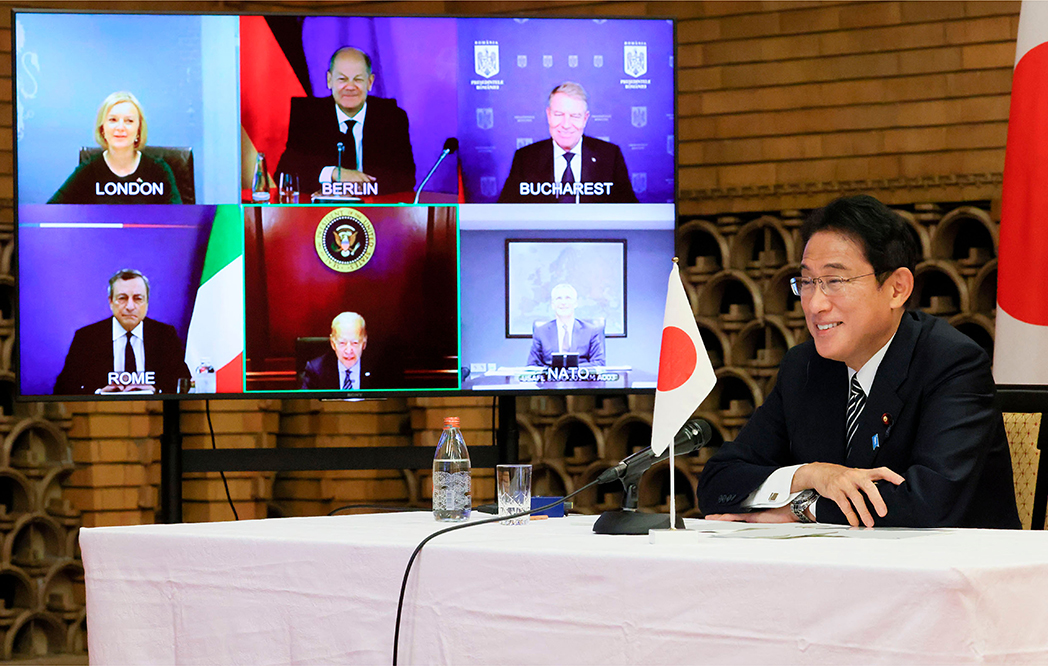
Prime Minister Kishida explaining Japan’s efforts to ensure a stable supply of energy and food during a video conference on the situation in Ukraine with the leaders of the United States, the United Kingdom, Germany, Italy, Canada, Poland, and Romania, as well as the NATO Secretary General (September 8, 2022) (Photo: Cabinet Public Relations Office)
1 Japan’s Efforts in Response to the Situation in Ukraine
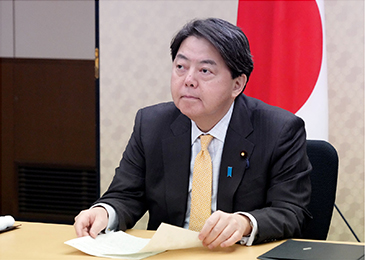
Foreign Minister Hayashi attending the G7 Foreign Ministers’ Meeting held in virtual format (February 2022)
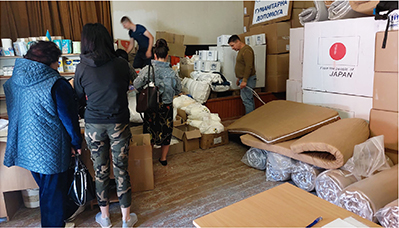
Internally displaced persons receiving relief items from Japan such as blankets, plastic sheets and sleeping mats in Yampil, Vinnytsia Oblast, Ukraine (Photo: UNHCR)
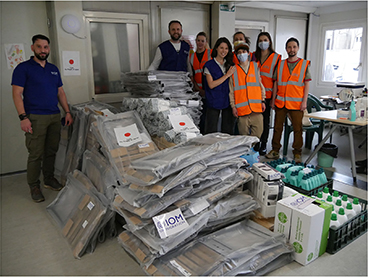
Shelter Operation in Romania for people fleeing Ukraine (Photo: IOM)
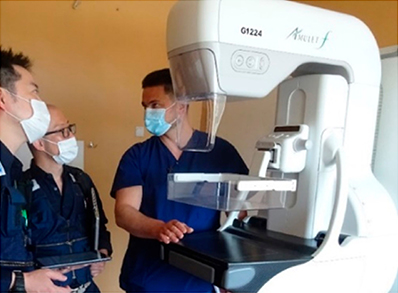
Activities by the JICA survey team dispatched to Moldova (Photo: JICA)
2022 was a year in which Russia’s aggression against Ukraine had major impacts not only on Ukraine and its neighboring countries, but also on the entire world, while COVID-19 was still not under control.
It has been reported that approximately one third of the population of Ukraine was displaced from their homes since the beginning of the aggression in February 2022, with 6.54 million people Note 1 forced to evacuate internally, including children and civilians, and nearly 16 million people Note 2 forced to seek safety abroad.
Many of the displaced persons both in and outside Ukraine have lost their jobs and are in tough situations. There are growing needs for assistance such as shelter, food, basic necessities, and health and medical care in both Ukraine and its neighboring countries where many Ukrainian people have evacuated. Meanwhile, ongoing attacks have damaged infrastructure and energy facilities across Ukraine. This situation continues to deteriorate the ability to provide essential social services such as health, medical care, and education. Furthermore, it is seriously bearing on the lives of citizens, due to the fact that debris removal as well as landmine and unexploded ordinance (UXO) disposal are firstly required so as to allow access to essential services and the provision of relief products. Additionally, the need for winterization assistance is also increasing due to the prolonged conflict.
Owing to the prolonged situation between Russia and Ukraine, both of which have been the world’s leading grain exporters, the stable supply of grain has been seriously affected especially in developing countries in Africa, the Middle East, and Asia, which depend heavily on imported grain produced in both countries. In addition, grain transaction prices are rising across the globe, inflating food prices. Furthermore, the energy prices are also soaring since the energy supply has not expanded globally due to multiple factors such as geopolitical tension caused by Russia’s aggression against Ukraine and unseasonable weather worldwide, while energy demand is increasing in line with the economic recovery from COVID-19.
As described above, Russia’s aggression against Ukraine has deteriorated the humanitarian situation in Ukraine and its neighboring countries and destabilized Ukraine’s economy and society. The situation has also disrupted global supply chains across the world, bringing into sharp relief new challenges for the entire international community, regarding food and energy security, which form the basis for people to live with dignity, as well as the maintenance and strengthening of a free and open trading system.
Such a complex crisis is by no means “someone else’s problem” for Japan, and has seriously affected both the life of Japanese citizens and the business of Japanese companies. Without resolute responses to any attempts to change the status quo, the consequences would be to allow any similar intentions in other areas and regions than Ukraine, including Asia. As Japan finds itself in the most challenging and complex security environment since the end of World War II, it becomes increasingly important to maintain and strengthen a free and open international order based on the rule of law and to fully uphold universal values such as freedom, democracy, human rights, and the rule of law. Taking the consistent position that Russia’s outrageous act should not be tolerated and that it is necessary to advance support for Ukraine and its neighboring countries, Japan has been working with the international community, including the G7 members, since the outset of Russia’s aggression against Ukraine.
At the G7 Foreign Ministers’ Meetings and the G7 Summit held during the months of April and March, Japan announced the provision of a total of 200 million US dollars in emergency humanitarian assistance. With this announcement, Japan clearly demonstrated its stance to stand by Ukraine and its people, to overcome this crisis in collaboration with the international community, including the G7 members, and to ensure the peace, stability, and prosperity of the international community.
Since then, Japan has continuously shown its willingness to work on the relevant issues by actively leading discussions in international forums such as the G7, G20, the Tokyo International Conference on African Development (TICAD), and the United Nations General Assembly, in collaboration with the international community. This includes not only responses to humanitarian crises, but also efforts for the comprehensive recovery and reconstruction of Ukraine and support for countries referred to as “the Global South,” since they are facing global food insecurity and energy crises caused by the situation in Ukraine and are becoming particularly vulnerable.
Japan responds to these humanitarian situations and provides medium- to long-term assistance for the recovery and reconstruction of Ukraine as well as assistance to the countries facing global food and energy security crises.
In December, the Ministry of Foreign Affairs (MOFA)’s supplementary budget included 60 billion yen for assistance in Ukraine and its neighboring countries, and 102.2 billion yen for developing countries in Asia, island countries, the Middle East, and Africa. As the role of the G7 grows more than ever before, Japan, as the holder of the 2023 G7 Presidency, takes the lead in addressing various issues facing the international community, including the situation in Ukraine.
(1) Emergency and Humanitarian Assistance in Ukraine and Its Neighboring Countries
A. Emergency and Humanitarian Assistance through International Organizations
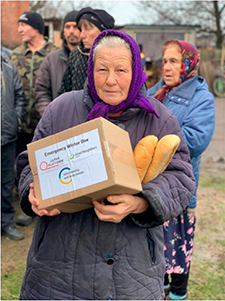
Food distribution support in Ukraine (Photo: Good Neighbors Japan)
Following the start of Russia’s aggression against Ukraine, on February 24, Japan issued a Foreign Minister’s Statement, addressing its intention to make efforts to improve the situation in cooperation with the international community including the G7 members, standing alongside Ukraine and its people. At the G7 Foreign Ministers’ Meeting held virtually three days later, Foreign Minister Hayashi announced emergency humanitarian assistance to Ukraine in the amount of 100 million US dollars, and other G7 countries strongly welcomed Japan’s decision. At the G7 Summit held in Brussels, Belgium, in March, Prime Minister Kishida shared serious concerns with other G7 leaders about the humanitarian situation in Ukraine and its neighboring countries and announced an additional 100 million US dollars in emergency humanitarian assistance. This was in response to a call for further assistance from Ukrainian President Zelenskyy, who attended the meeting.
To put forward the announcement of assistance at the G7 meeting, Japan decided to provide emergency humanitarian assistance totaling 100 million US dollars in March, and an additional 100 million US dollars in April. Note 3 The said assistance, summed up to 200 million US dollars, was provided to Ukraine and its neighboring countries, namely Moldova, Poland, Hungary, Romania, Slovakia, and the Czech Republic, through 10 international organizations. These organizations included the United Nations High Commissioner for Refugees (UNHCR), the UN World Food Programme (WFP), the International Committee of the Red Cross (ICRC), the United Nations Children’s Fund (UNICEF), and the International Organization for Migration (IOM). This humanitarian assistance was delivered to the people of Ukraine facing difficulties in urgent areas such as health and medical care, water and sanitation, food assistance and food security, and protection of displaced persons and children.
B. Bilateral Assistance
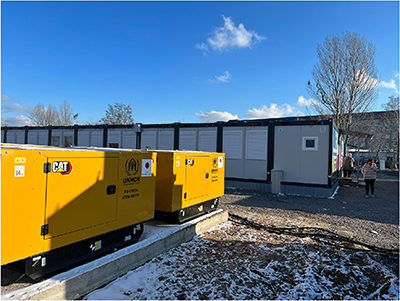
Generators provided by Japan and installed in shelters in Bucha District, Kyiv Oblast (Photo: UNHCR)
Japan makes efforts in response to the situation in Ukraine through JICA, utilizing the network established with other countries and international organizations. JICA dispatched its survey team three times between March and May to Moldova, where Japan has a track record of cooperation in the medical and health sector since the 1990s, in order to assess the cooperation need for accepting displaced persons from Ukraine in the health, medical and humanitarian assistance sectors. In collaboration with the Ministry of Health of Moldova and the World Health Organization (WHO), with whom Japan has long-standing cooperative relationships, Japan coordinated the activities of emergency medical teams from various countries, capitalizing on its know-how accumulated from past disaster relief activities. Japan also embodied the support needs in concrete terms, selected emergency medical equipment, formulated plans for deploying emergency medical teams in preparation for a possible deterioration of the situation, and supported medical data management. In May and September, Japan also donated wireless portable ultrasound devices.
In July, Japan began dispatching experts to Moldova to strengthen its capacity to maintain and manage medical equipment. In August, Japan decided to donate medical equipment worth 1 billion yen to five hospitals that were receiving displaced persons from Ukraine in Chisinau, the capital of Moldova.
In October, Prime Minister Kishida attended the “International Expert Conference on the Recovery, Reconstruction and Modernization of Ukraine,” co-hosted by the Government of Germany and the European Commission, by sending a video message. In the message, Prime Minister Kishida announced that Japan would extend winterization assistance to Ukraine for the forthcoming harsh winter season, in addition to the cooperation provided so far, such as protection and support for displaced persons. Prime Minister Kishida also indicated that Japan, as the 2023 G7 Presidency, would actively lead discussions within the international community toward the speedy restoration of peace and reconstruction in Ukraine. To give shape to this proposal, Japan announced it would extend Emergency Grant Aid of approximately 2.57 million US dollars in November. The assistance included the provision of generators and solar lanterns as winterization assistance through UNHCR to those who are unable to use heating facilities and lighting equipment due to blackouts. In December, Parliamentary Vice-Minister for Foreign Affairs Yoshikawa attended the “International Conference in Support of Ukraine’s Civil Resilience,” co-hosted by the Governments of France and Ukraine in Paris, and made known the passing of the supplementary budget, which included a budget for additional assistance in Ukraine and its neighboring countries. Parliamentary Vice-Minister Yoshikawa also announced that Japan would provide necessary humanitarian assistance together with support for Ukraine’s recovery and reconstruction, focusing on urgent humanitarian assistance and strengthening the civilian resilience of the Ukrainian people, along with energy-related support in the form of generators and the like.
C. Efforts by Japanese NGOs
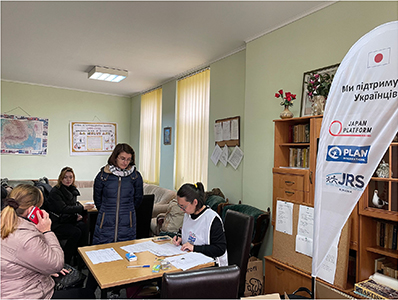
Distributing vouchers that can be exchanged for children’s winter items to displaced people from Ukraine staying in Romania (Photo: Plan International Japan)
Japanese NGOs also provide a wide range of humanitarian assistance, utilizing ODA. The Japan Platform (JPF) Note 4 decided to conduct a preliminary investigation by member NGOs the day after Russia started its military operations and began investigating the assistance needs and the procurement condition in Ukraine and its neighboring countries. Considering the steeply increasing number of displaced persons and the result of the survey, JPF decided to go into action on March 7. Of the aforementioned total of 200 million US dollars in emergency humanitarian assistance by the Government of Japan, approximately 3.5 billion yen (32.6 million US dollars) was provided to JPF. Together with private funds, support programs worth a total of 4 billion yen have been organized so far, and 12 JPF member NGOs implement support projects. These NGOs provide assistance capitalizing on their strength, such as psychological and social support activities that address the concerns of displaced persons and evacuation support for those who live in dangerous areas, in addition to the distribution of food and daily necessities (including winterization goods) and assistance in the areas of water and sanitation, and medical care.
Furthermore, considering local needs and international trends, the Government of Japan decided in October to relax the requirements and expand the usage of cash transfer support of JPF’s emergency and humanitarian assistance projects in response to the situation surrounding Ukraine. Support activities, including cash transfer support, began to be implemented in February 2023.
D. Cooperation among Relevant Ministries and Agencies
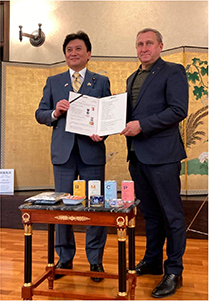
Then State Minister of Agriculture, Forestry and Fisheries Takebe handing the list of relief supplies to Mr. Deshchytsia, Ambassador of Ukraine to Poland (Photo: Ministry of Agriculture, Forestry and Fisheries)
In an effort to meet the urgent needs of Ukraine and its neighboring countries, the Government of Japan is working to provide prompt assistance through close coordination among relevant ministries and agencies.
At the G7 Extraordinary Agriculture Ministers’ Meeting held in March, the ministers agreed to cooperate in providing assistance to Ukraine in the agricultural and food sectors. In the same month, Dr. Korsunsky, Ambassador of Ukraine to Japan, made a direct request for food aid to then Minister of Agriculture, Forestry and Fisheries Kaneko. Based on this request, the Ministry secured a total of 15 tons of Japanese groceries as relief supplies, consisting of packed rice, canned fish, whole milk powder, and canned bread. In May, these foodstuffs were transported to Poland along with goods such as medicines and medical equipment donated by Japanese pharmaceutical and medical equipment companies to the Embassy of Ukraine in Japan. Then State Minister of Agriculture, Forestry and Fisheries Takebe visited Warsaw in Poland at this opportunity and handed over the abovementioned relief supplies to the Government of Ukraine.
In April, in response to a request from then Ukrainian Minister of Internal Affairs Monastyrsky to then Minister for Internal Affairs and Communications Kaneko, the Ministry of Internal Affairs and Communications secured 25 items of fire-fighting/rescue materials and equipment, and communication devices, totaling 30 tons, that could be used in Ukraine, with the cooperation of the Japanese fire departments and private sector organizations/enterprises. In May, the Government of Japan decided to extend Emergency Grant Aid of approximately 1.66 million US dollars to the United Nations Office for Project Services (UNOPS) to transport these relief supplies. These relief supplies were delivered to the depot for Ukrainian relief supplies in Poland, along with relief supplies such as medicines and medical supplies donated by private companies to the Embassy of Ukraine in Japan.
E. Non-ODA Budgetary Efforts
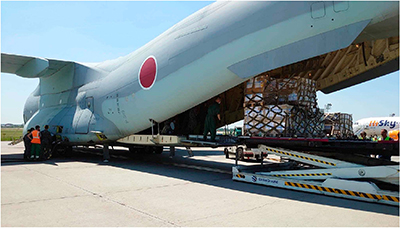
A Japan Self-Defense Force aircraft transporting UNHCR humanitarian relief supplies, which were delivered afterward to displaced persons from Ukraine via UNHCR (Photo: Ministry of Defense)
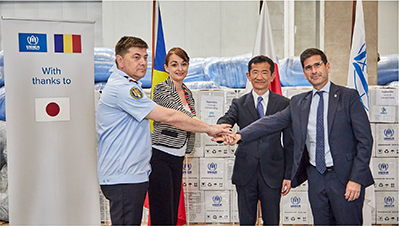
Humanitarian relief supplies transported by a Japan Self-Defense Force aircraft arriving in Romania. (From the left) Mr. Dogeanu, Head of the General Directorate for Civil Protection in the Romanian Ministry of Internal Affairs, Ms. Toderean, Director General of the Department for Global Affairs in Romanian Ministry of Foreign Affairs, Mr. Ueda, Ambassador of Japan to Romania, and Mr. Zapata, UNHCR Representative in Romania, confirming Japanese assistance (Photo: UNHCR)
The Government of Japan also provides non-ODA assistance. In April, in response to a request from UNHCR, Japan donated 5,000 blankets, 4,500 plastic sheets, and 8,500 sleeping mats to UNHCR as in-kind assistance in accordance with the International Peace Cooperation Act. In addition, approximately 103 tons of humanitarian relief supplies stockpiled at the UNHCR warehouse in Dubai (United Arab Emirates) were transported to Poland and Romania by a Japan Self-Defense Force aircraft. The transported goods are being delivered to people displaced from Ukraine through UNHCR.
In addition, under Article 116-3 of the Self-Defense Forces Law, Japan grants equipment and goods of the Japan Self-Defense Forces to the Government of Ukraine, including bulletproof vests, helmets, winter battle dress uniforms, tents, cameras, medical supplies, emergency rations, and generators, ensuring their appropriate control after the transfer.
- Note 1: International Organization for Migration (IOM) Displacement Tracking Matrix (DTM), statistics dated October 2022.
- Note 2: United Nations High Commissioner for Refugees (UNHCR) Operational Data Portal, statistics dated November 29, 2022.
- Note 3: Including 3 million US dollars provided via FAO and 4.5 million US dollars via UNDP as described in “(2) Support for the Stability and Reconstruction of Ukraine.”
- Note 4: See the glossary.
